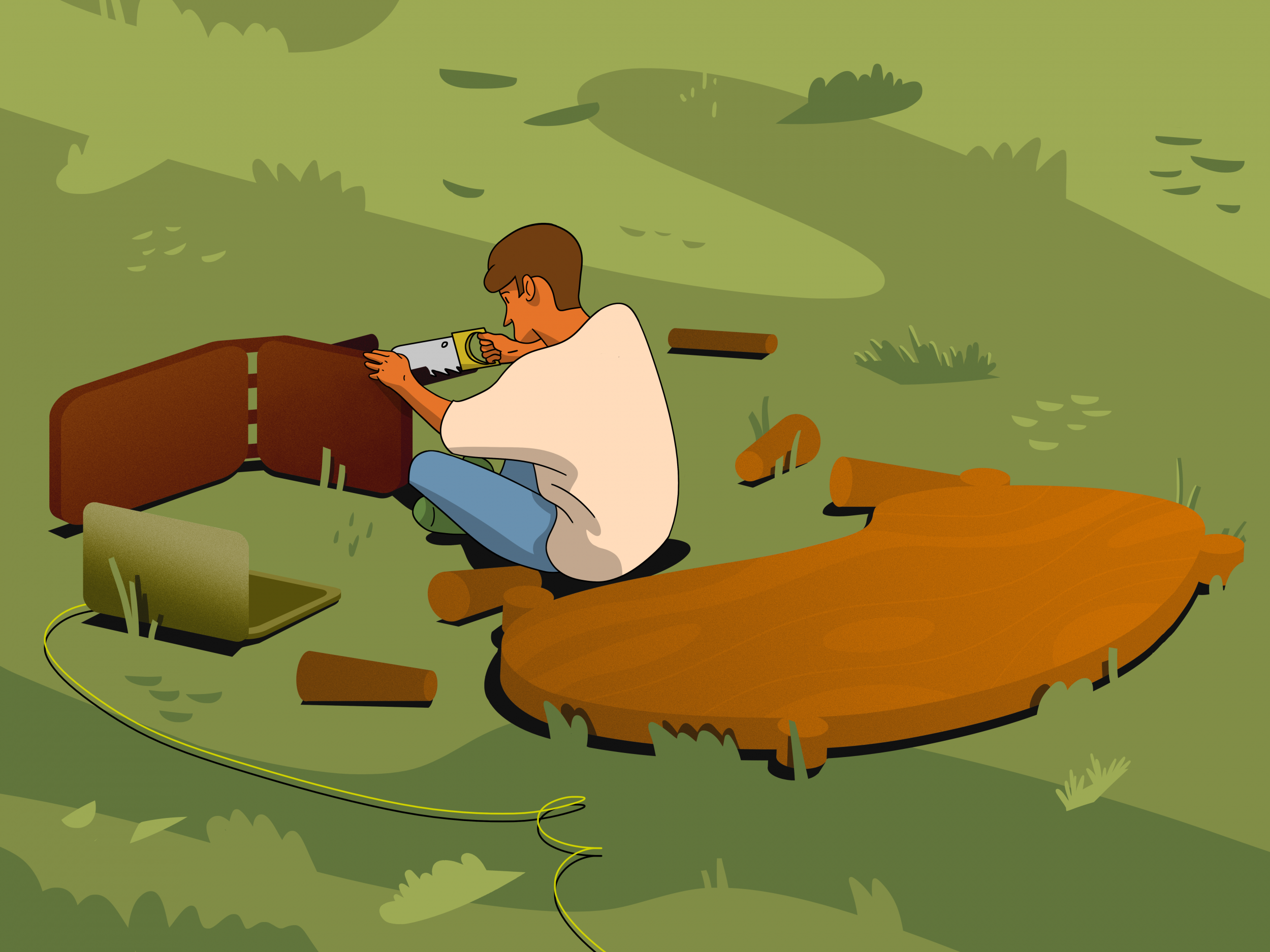It’s time to get rid of the chair and saw the legs off the desk while you’re at it
With more of us working from home without our usual ergonomic set-ups, Christine Manby looks at the case against sitting as we know it


I predict that one of the unintended consequences of lockdown is going to be a rise in back pain as workers up and down the country have swapped ergonomically-designed office set-ups for the kitchen table, a wonky dining chair and a laptop. If we’re going to be working from home much more in the future, then it makes sense to make sure that our homes are properly set up for work as well as slumping in front of Netflix, doesn’t it? Maybe it’s time to look into buying a proper office chair for the kitchen? Or a standing desk for the corner of the living room? Or maybe, as suggested by Tony Riddle, it’s time to get rid of the chair altogether. And take the legs off the desk while you’re at it.
Tony Riddle is a “natural lifestyle coach” (his clients have included heavyweight champion of the world David Haye) and a passionate advocate for what he calls “ground living”. There are no chairs in Riddle’s home. No sofa. He sawed the legs off his dining table.
For anyone conditioned to expect a grown-up house to contain at least one comfy chair for every bottom, Riddle’s home might look a little student-style. But there’s hard science behind the hard seating options he espouses.
Riddle started out as a personal trainer, running a successful Pilates studio. Many of his clients arrived at the studio with back and knee issues, which Pilates was able to ameliorate to a certain degree. But Riddle became concerned that he was treating the symptoms rather than the causes of his clients’ discomfort. Was it possible that the work his clients were doing in the hour or two they spent in the Pilates studio was negated by the way they moved – or didn’t move – during the rest of their day? As he looked for answers, Riddle studied martial arts and yoga. He also studied the movement habits of a number of what he refers to as “natural beings”.
Riddle frequently references the Hadza, a people living in northern Tanzania. The Hadza don’t raise livestock or grow crops. They are modern hunter-gatherers, still living the way their ancestors did 10,000 years ago. Thus Riddle surprises me when he says: “They are just as sedentary as we are. The only difference is, they don’t use chairs.”
Exercise has become very specialised. We need to rewild our lives and introduce more play
It’s well known that sitting for too long isn’t a good idea. As the NHS website states, “Sitting for long periods is thought to slow the metabolism, which affects the body’s ability to regulate blood sugar, blood pressure and break down body fat.” It’s estimated that the average adult in the UK spends some nine hours a day sitting down. The good news is that the UK Chief Medical Officer’s Physical Activity Guidelines report suggests that you only need to break up a long period of sitting with one to two minutes of activity. The bad news, as we all know, is that it can be remarkably difficult even to remember to take those one- to two-minute movement breaks with any regularity.
In a chair, particularly a soft chair, it’s frighteningly easy to assume one position and stay there for hours on end. Sitting on the floor however, you can’t get quite as comfortable, so naturally you will shift and fidget and change position without having to think about it. Thus, the ground-living Hadza never really stop moving. “The key is to always be mobilising,” says Riddle.
Riddle describes how he saw the effects of modern seating habits in his own children. “I could see that when they were sitting in chairs, their posture was starting to go in all the same areas (as his Pilates clients).”
Riddle and his wife subsequently did away with the chairs in their home and soon noticed the difference. “It was unbelievable how mobile, strong and flexible we were becoming.” He noticed the difference ground living made to his performance and recovery as an endurance athlete too. “There was no need for concentrated stretch programmes. Just going back to the ground.”
Riddle says: “Exercise has become very specialised. We need to rewild our lives and introduce more play. It shouldn’t take a lot of effort.” He coaches premiership footballers, assuring me that they are too often “hammered in the hips”. Sitting in a chair is bad news for the hip flexors in particular. Ground living, and in particular squatting, can offset that damage. It’s perhaps no surprise that Riddle is a keen advocate of bare-foot running too. If you compromise the feet, then of course you compromise your entire body.
Not only has Riddle eschewed chairs, he doesn’t have a bed. Instead, he and his wife sleep on a mattress topper on the floor. He makes sure the family’s bed-clothes are made exclusively from natural materials. Apart from being good for you, sleeping on a mattress topper means you can roll it away when you get up, suddenly freeing up a vast amount of floorspace, which has to be a bonus when you’re spending more time at home
I don’t think I’ll be squatting in the queue for Sainsbury’s anytime soon, but the basic tenets of Riddle’s philosophy are easy to incorporate into a life where WFH is the norm
Interestingly, while Riddle is a strong advocate of sleep hygiene, he is far from hung up on the idea that everyone needs eight hours sleep a night. Once again, he references the Hadza, who wake several times during the hours of darkness. Our recent obsession with tracking our daily cycles with Fitbits etc has made us think that broken sleep is a bad thing. But perhaps it’s not if your sleep is broken in the right way, with you waking briefly at the end of a full cycle rather than being woken by the alarm halfway through a dream about your ex.
It might be hard to imagine taking some of Riddle’s practices out into the wilds of south London. I don’t think I’ll be squatting in the queue for Sainsbury’s anytime soon, but the basic tenets of his philosophy are easy to incorporate into a life where WFH is the norm.
Riddle has turned his research into a six-week online programme where you can learn to “rewild your squat”. The online programme isn’t cheap, but don’t let that put you off exploring Riddle’s ideas in your own way. As he told me, “it’s not about habit but about habitat. Start with small changes. If you’re going to have a Netflix binge, take it to the ground.”
Since hearing Riddle’s arguments for ground-living, I’ve swapped working at my kitchen table for working at the coffee table while sitting on the floor. It’s surprisingly comfortable and when I get up, my back doesn’t feel stiff in the same way as it did when rising from my expensive ergonomic chair. I’m not quite ready to saw the legs off my kitchen table yet but I have been looking at my bed with a critical eye and considering how nice it would be to be able to roll it out of the way altogether. It would certainly discourage me from getting back into it mid-afternoon.
While Riddle’s philosophy may look extreme at first glance, I really don’t think you can argue with the fact that we humans have chosen to live our lives in ways that are fundamentally bad for us. This lockdown has offered the opportunity for many to see just how pointless the daily commute is, for example. Many of us have enjoyed exercising outdoors far more than slogging away in the gym. After all these weeks spent staring at the same four walls, who wouldn’t like the extra space that swapping a bed for a mattress-topper might bring?
Riddle’s philosophy is that “we can’t all live in nature, but that doesn’t mean we can’t live naturally”. Perhaps the “new normal” should look much more like the “old normal”. Hadza-style.
Join our commenting forum
Join thought-provoking conversations, follow other Independent readers and see their replies
Comments